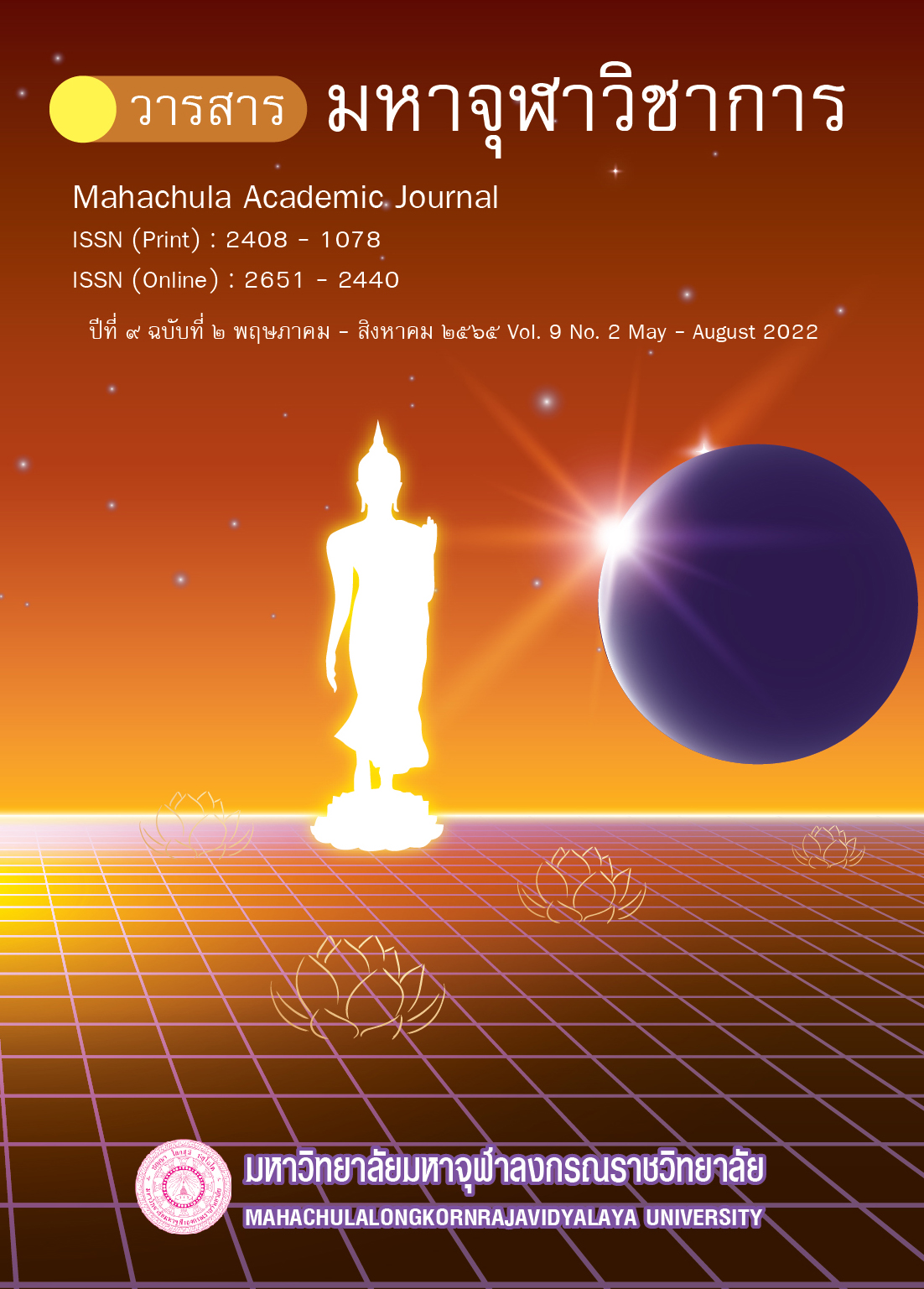Reasons of Beliefs in Thai Society: Trace from Sukhothai Inscriptions
Main Article Content
Abstract
The article“Reasons of Beliefs in Thai Society: Trace from Sukhothai Inscriptions” portrays the system of belief in Thai society from the past to present through a group of Sukhothai inscriptions. As the assumption that humans always have their own reasons to choose any belief for their life even those reasons seem ridiculous. In fact, all beliefs support psychological mechanisms of mankind in some ways. Thus, this article pointed to the initial religion of primitive era called “Animism” that was later named as “Primitive Religion” that has the central belief at spirit and gods of nature. Furthermore, Animism has become the universal religion that found in every part of the world and also be the basis of all religions today. According to the study, the majority beliefs found in Sukhothai inscriptions are religious beliefs from Primitive Religion, Brahmanism and Buddhism. This indication shows the hybridization of all religions that become the specific form of belief as Identity of Thai people. Consequently, the reasons of those beliefs are: Thai people take those beliefs as a hope for the better life and as a safe place to escape from their unpleasant life. Most of all, ridiculous beliefs are some kinds of habituation to them.
Article Details

This work is licensed under a Creative Commons Attribution-NonCommercial-NoDerivatives 4.0 International License.
References
กรมศิลปากร. ประชุมจารึกภาคที่ ๘ จารึกสุโขทัย. กรุงเทพมหานคร: อัมรินทร์พริ้นติ้งแอนด์พับลิชชิ่ง จำกัด (มหาชน), ๒๕๔๘.
กรมศิลปากร. ประวัติศาสตร์ชาติไทย. กรุงเทพมหานคร: กระทรวงวัฒนธรรม, ๒๕๕๘.
ขนิษฐา จิตชินะกุล. คติชนวิทยา. กรุงเทพมหานคร: โอเดียนสโตร์, ๒๕๔๕.
ชะเอม แก้วคล้าย. สารัตถะจากศิลาจารึกในประเทศไทย เล่ม ๑. กรุงเทพมหานคร: สถาบันวิจัยนานาชาติธรรมชัย (ออสเตรเลียและนิวซีแลนด์), ๒๕๕๖.
ชะเอม แก้วคล้าย. สารัตถะจากศิลาจารึกในประเทศไทย เล่ม ๒. กรุงเทพมหานคร: สถาบันวิจัยนานาชาติธรรมชัย (ออสเตรเลียและนิวซีแลนด์), ๒๕๕๘.
ธิดา สาระยา. ประวัติศาสตร์สุโขทัย: พลังคน อำนาจผี บารมีพระ. กรุงเทพมหานคร: สำนักพิมพ์เมืองโบราณ, ๒๕๔๔.
ประเวศ อินทองปาน. ศาสนาเชิงวิเคราะห์และเปรียบเทียบ. กรุงเทพมหานคร: มหาวิทยาลัยเกษตรศาสตร์, ๒๕๖๒.
มูลนิธิเล็ก-ประไพ วิริยะพันธุ์. สุโขทัย: อรุณรุ่งของสยามประเทศ. กรุงเทพมหานคร: วารสารเมืองโบราณ, ๒๕๕๘.
วิราวรรณ สมพงษ์เจริญ. “คติความเชื่อของคนไทยสมัยสุโขทัย พ.ศ. ๑๗๒๖- พ.ศ.๒๐๐๖”. วิทยานิพนธ์อักษรศาสตรมหาบัณฑิต. มหาวิทยาลัยศิลปากร, ๒๕๕๐.
สุรพล ดำริห์กุล. ประวัติศาสตร์และศิลปะสุโขทัย. กรุงเทพมหานคร: สำนักพิมพ์เมืองโบราณ, ๒๕๖๒.
เสฐียร พันธรังษี. ศาสนาโบราณ (พิมพ์ครั้งที่ ๔). กรุงเทพมหานคร: พิมพ์ดีการพิมพ์, ๒๕๔๓.
Green, M.G. and Piel, J.A. Theories of Human Development: A Comparative Approach. New York: Routledge Publishing, 2010.
Guelden, M. Thailand: Spirits Among us. Singapore: Marshall Cavendish, 2007.
Harvey, Graham. Animism: Respecting the Living World. London: Hurst & Co., 2005.
Kitiarsa Pattana. “You may not Believe, but Never Offend the Spirits: Spirit Medium Cult Discourses and the Post-modernization of Thai Religion”. Doctor of Philosophy. Graduate School: University of Washington, 1999.
Pritchard, E.E. Theories of Primitive Religion. London: Oxford University Press. 1965.
Schrempp, G., “The Re-Education of Friedrich Max Muller: Intellectual Appropriation and Epistemological Antinomy in Mid-Victorian Evolutionary Thought”. Man, Vol.18, no.1 (1983): 90–110.
Swanton, John R. “Three Factors in Primitive Religion”. American Anthropologist, Vol. 26, no.3 (1924): 358-365.
Suwanlert, Sangun. “Phii Pob: Spirit Possession in Rural Thailand, Culture-Bound Syndromes, Ethnopsychiatry and Alternate Therapies”. Mental Health Research in Asia and the Pacific, Vol.1, no.4 (1976): 68-87.
Berry, W. Existence is Suffering (online). Available: https://www.psychologytoday.com/us/blog/the-second-noble-truth/201609/existence-is-suffering. [2 June 2021].
Lewis Ralph. What Actually Is a Belief? And Why Is It So Hard to Change? (online). Available: https://www.psychologytoday.com/intl/blog/finding-purpose/201810/what-actually-is-belief-and-why-is-it-so-hard-change#_=_. [24 June, 2021].
Park, G. Kerlin. (2020). Animism (online). Available: https://www.Britannica.com/topic/animism. [18 September 2020].


